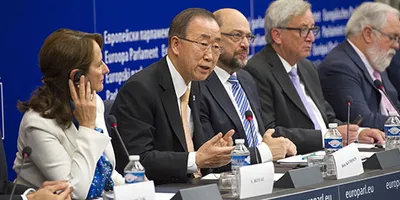In December 2015, representatives from nearly 200 countries gathered in Paris for the United Nations Climate Change Conference (COP21). The primary objective was to negotiate a universal agreement on climate change to mitigate its impacts. The result was the Paris Agreement, hailed as a historic milestone in global efforts to combat climate change.
Adopted on December 12, 2015, the Paris Agreement marked a significant departure from previous climate accords. Unlike its predecessors, the Kyoto Protocol, which only imposed emission reduction targets on developed nations, the Paris Agreement aimed to include all countries in the fight against climate change. This inclusivity was crucial, as it recognized that every nation, regardless of its level of development, has a role to play in addressing the climate crisis.
At the heart of the Paris Agreement is the commitment to limit global warming to well below 2 degrees Celsius above pre-industrial levels, with efforts to limit the temperature increase to 1.5 degrees Celsius. Achieving this goal requires countries to submit nationally determined contributions (NDCs) outlining their plans to reduce greenhouse gas emissions. These contributions are not legally binding, but the agreement includes mechanisms for transparency and accountability to ensure that countries are held accountable for their commitments.
One of the key strengths of the Paris Agreement is its flexibility. Recognizing that circumstances vary from country to country, the agreement allows each nation to set its own targets and develop its own strategies for reducing emissions. This approach encourages participation and fosters a sense of ownership among countries, increasing the likelihood of successful implementation.
Another notable aspect of the Paris Agreement is its emphasis on climate finance. Developed countries have committed to providing financial assistance to developing nations to help them mitigate and adapt to the impacts of climate change. This support is essential for ensuring that vulnerable countries have the resources they need to build resilience and transition to low-carbon economies.
Since its adoption in 2015, the Paris Agreement has achieved widespread ratification, with nearly every country in the world signing on. However, its effectiveness depends on the willingness of countries to translate their commitments into concrete action. As the impacts of climate change become increasingly severe, there is an urgent need for ambitious and coordinated efforts to reduce emissions and build a more sustainable future.
In conclusion, the Paris Agreement represents a landmark achievement in global climate action. By bringing together countries from around the world to commit to collective action on climate change, the agreement provides a framework for cooperation and collaboration in the fight against one of the most pressing challenges of our time. However, its success ultimately depends on the commitment and determination of governments, businesses, and individuals to take meaningful steps to reduce emissions and safeguard the planet for future generations.
newshub



Recent Comments